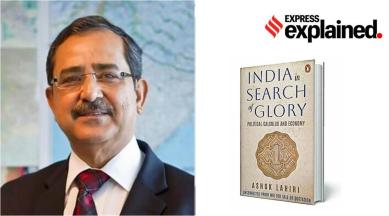Udit Misra is Senior Associate Editor. Follow him on Twitter @ieuditmisra ... Read More
© The Indian Express Pvt Ltd

By all past accounts — especially the work by economic historian Angus Maddison — India was one of the richest countries in the world in the ancient past. That story turned sour with British colonialism. Independent India, for the past 75 years, has been slowly and steadily trying to reclaim its past glory.
But as India became more and more populous (and younger), and as comparable countries such as China and Korea sped past it, there was impatience about why India could not do more. Indians wonder what went wrong, or, more precisely, why did we fail to grow faster. Did India not have the right leaders? Did India adopt the wrong economic policies? Did India give primacy to democracy when it should have prioritised economic development? Is communal conflict holding us back?
In this book, the author, who has not only been India’s Chief Economic Advisor but also served in the 15th Finance Commission, apart from being a member of West Bengal’s legislative Assembly (from the BJP), lays out many such questions and attempts an exhaustive retelling of India’s political economy while trying to answer the questions.
The exasperation with the slow growth has been constant, and, as the author recounts, it was most evocatively captured in the 1970s by Prof Raj Krishna of the Delhi School of Economics, who said: “No matter what India did, on average, it tended to grow annually only at the ‘Hindu’ rate of around 3.5!”.
What does Lahiri conclude? He writes that while democracy has served India well in building the nation, socio-economic development has been tepid in the first seven decades after Independence. He hopes that as Indian democracy matures and people benefit from higher incomes, less poverty, more education, and urbanisation, such development is likely to accelerate.
The almost 800-page book is divided into 29 chapters, apart from an extensive bibliography and chapter notes. Lahiri uses separate chapters to look at the various twists and turns in India’s political and policy regimes. More often than not, the chapters are co-terminus with the five-year terms of various governments.
Even though the book has been released recently, Lahiri stops at the end of the first Modi government’s tenure in 2019. This is unfortunate since we are near the end of the government’s second term. While the book analyses several key variables — from per capita GDP growth to poverty and from inflation to balance of payment — a glaring miss has been the issue of unemployment, especially since it hit historic highs during 2017-18.
Title | India in Search of Glory
Author: Ashok Lahiri
Publisher: Penguin
Pages: 712
Price: Rs 891